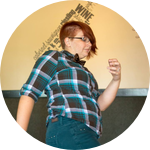About This Project
Working together to solve problems is one of the hardest things humans do, and we do it all the time. When we have different understandings of the best possible solution, working together becomes even more difficult. What if we could make coming to a compromise easier with technology?Ask the Scientists
Join The DiscussionWhat is the context of this research?
Compromise has been studied in philosophical and psychological contexts, but not in a computer science context. Computer Supported Collaborative Work tends to emphasize situations where all parties have a shared goal definition. There are very few existing design recommendations for people who are working together but need different outcomes from a project.
My work is situated in a real urban planning problem, where residents are often brought into planning meetings. However, most of the time, those residents are not given enough information relevant to their interests to make real, meaningful decisions.
What is the significance of this project?
This work aims to help residents enter the problem space more easily. The users of this technology will get data visualizations and information presented to them based on their interests. This will allow them to make better, more meaningful decisions. As more urban planning meetings include various simulations, more support will be needed for participants to make sense of those simulations. I want to start with the participants' interests first.
What are the goals of the project?
- Run user studies to discover what design choices best support compromise
- Gathering personal preferences
- Visualizing those preferences
- Visualizing data according to the preferences listed
- Publish results in conferences
Budget
Although I'm doing the primary development of the software myself, the grants funding my work have generally run out. Hopefully that will change by next year, but a little financial support for my work could make a huge difference. There are also direct costs in recruiting participants to be part of the user studies, and getting them involved. Finally, for me to make the research available to urban planners and computer scientists, I need to publish in conferences. I've allocated a third of the budget to conference registration costs.
If I get over-funded, I will also put money towards publishing Open Access. Unfortunately, at this time, Springer charges $1000 to make articles Open Access, so my base research funding level does not include that cost.
Meet the Team
Team Bio
Computer Science became my focus as something of an accident -- when I graduated high school, I wanted to do a double major in art and math. When I got to college, they had only registered me for one of those majors, and rather than trying to properly design my major, I decided to do CS instead, since it's a bit of both.This project has become very near and dear to me these past few years. The opportunity to support democracy by increasing information is really fantastic, and I'm excited to get this project out there and available.
Lab Notes
Nothing posted yet.
Project Backers
- 4Backers
- 8%Funded
- $110Total Donations
- $27.50Average Donation
